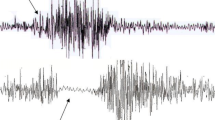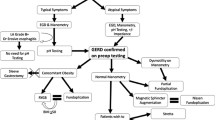Abstract
Objectives
We assessed the severity of dysphagia before and after oral cavity cancer surgery.
Methods
We retrospectively reviewed modified barium swallow (MBS) studies of 12 patients who underwent surgery for oral cavity cancer. A MBS was performed before and after treatment to assess the severity of dysphagia and aspiration risk. All patients were cancer-free at the time of the posttreatment MBS. Dysphagia severity was graded from 1 to 7 on a scale of increasing severity.
Results
Before surgery, seven cases were grade 1 and five were grade 2 dysphagia. At a median of 2 months (1–15 months) following surgery, grade 1–6 dysphagia was present in one, two, four, three, one, and one patient, respectively. In all, 17% (2/12) of the patients developed aspiration (grades 5–7). Seven patients (58%) experienced mild to moderate dysphagia. Only three patients (25%) had normal swallowing postoperatively. The two patients who developed aspiration had T3 tumors and underwent hemiglossectomies.
Conclusions
Dysphagia is common following surgery for oral cavity cancer. Diagnostic studies such as MBS should be included in future prospective oral cavity cancer studies to assess the dysphagia severity and for patient rehabilitation.
Similar content being viewed by others
References
Sciubba JJ. Oral cancer. The importance of early diagnosis and treatment. Am J Clin Dermatol 2001;2:239–251.
Tupchong L, Scott CB, Blitzer PH, Marcial VA, Lowry LD, Jacobs JR, et al. Randomized study of preoperative versus postoperative radiation therapy in advanced head and neck carcinoma: long-term follow-up of RGOT study. Int J Radiat Oncol Biol Phys 1991;20:21–28.
Hara I, Gellrich NC, Duker J, Schon R, Nilius M, Fakler O, et al. Evaluation of swallowing function after intraoral soft tissue reconstruction with microvascular free flaps. Int J Oral Maxillofac Surg 2003;32:593–599.
Furia CL, Carrara-de Angelis E, Martin NM, Barros AP, Carneiro B, Kowalski LP. Videofluoroscopic evaluation after glossectomy. Arch Otolaryngol Head Neck Surg 2000;126:378–383.
McConnel FM, Logemann JA, Rademaker AW, Pauloski BR, Baker SR, Lewin J, et al. Surgical variables affecting postoperative swallowing efficiency in oral cancer patients: a pilot study. Laryngoscope 1994;104:87–90.
Pauloski BR, Logemann JA. Impact of tongue base and posterior pharyngeal wall biomechanics on pharyngeal clearance in irradiated post surgical oral and oropharyngeal cancer patients. Head Neck 2000;22:120–131.
Schliephake H, Ruffert K, Schneller T. Prospective study of the quality of life of cancer patients after intraoral tumor surgery. J Oral Maxillofac Surg 1996;54:664–669.
Nguyen NP, Frank C, Moltz CC, Smith HJ, Karlsson U, Dutta S, et al. Impact of dysphagia on quality of life following treatment for head and neck cancer. Int J Radiat Oncol Biol Phys 2005;61:772–778.
Stenson KM, McCracken E, List M. Swallowing function in patients with head and neck cancer patients prior to treatment. Arch Otolaryngol Head Neck Surg 2000;126:371–377.
Aviv JE. Prospective, randomized outcome study of endoscopy versus modified barium swallow in patients with dysphagia. Laryngoscope 2000;110:563–574.
Nguyen NP, Vos P, Moltz CC, Frank C, Millar C, Smith HJ, et al. Analysis of the factors influencing dysphagia severity upon diagnosis of head and neck cancer. Br J Radiol 2008;81:706–710.
Nguyen NP, Moltz CC, Frank C, Vos P, Smith HJ, Karlsson U, et al. Long-term aspiration following treatment for head and neck cancer. Oncology 2008;74:25–30.
Nguyen NP, Frank C, Moltz CC, Vos P, Smith HJ, Dutta S, et al. Dysphagia severity and aspiration following postoperative radiation for head and neck cancer. Anticancer Res 2008;28:431–434.
Nguyen NP, Moltz CC, Frank C, Vos P, Smith HJ, Karlsson U, et al. Evolution of chronic dysphagia following treatment for head and neck cancer. Oral Oncol 2006;42:374–380.
AJCC cancer staging manual. 6th ed. New York: Springer; 2002.
Jager-Wittenaar H, Dijkstra PU, Vissink A, van der Laan BF, van Oort RP, Roodenburg JL. Critical weight loss in head and neck cancer — prevalence and risk factors at diagnosis: an explorative study. Support Care Cancer 2007;15:1045–1050.
Karnell MP, McCracken E. A data base information storage and reporting system for videofluorographic oropharyngeal motility swallowing evaluation. Am J Speech Lang Pathol 1994;8:54–60.
Logemann JA, Bytell DE. Swallowing disorders in three types of head and neck surgical patients. Cancer 1979;44:1095–1105.
Hirano M, Kuroiwa Y, Tanaka S, Matsuoka H, Sato K, Yoshida T. Dysphagia following various degrees of surgical resection for oral cancer. Ann Otol Rhinol Laryngol 1992;101:138–141.
Mah SM, Durham JS, Anderson DW, Irvine RA, Chow C, Fache JS, et al. Functional results in oral cavity reconstruction using reinnervated versus nonreinnervated free fasciocutaneous grafts. J Otolaryngol 1996;25:75–81.
Finlay PM, Dawson F, Robertson AG, Soutar DS. An evaluation of functional outcome after surgery and radiotherapy for intraoral cancer. Br J Oral Maxillofac Surg 1992;30:14–17.
Rosen A, Rhee TH, Kaufman R. Prediction of aspiration in patients with newly diagnosed untreated advanced head and neck cancer. Arch Otolaryngol Head Neck Surg 2001;127:975–979.
Logemann JA. Role of the modified barium swallow in management of patients with dysphagia. Otolaryngol Head Neck Surg 1997;116:335–338.
Denk DM, Swoboda H, Schima W, Eisenberger K. Prognostic factors for swallowing rehabilitation following head and neck surgery. Acta Otolaryngol 1997;117:769–774.
Author information
Authors and Affiliations
Corresponding author
Rights and permissions
About this article
Cite this article
Nguyen, N.P., Frank, C., Moltz, C.C. et al. Dysphagia severity and aspiration risk following oral cavity cancer surgery. Oral Radiol 24, 76–79 (2008). https://doi.org/10.1007/s11282-008-0080-8
Received:
Accepted:
Published:
Issue Date:
DOI: https://doi.org/10.1007/s11282-008-0080-8




